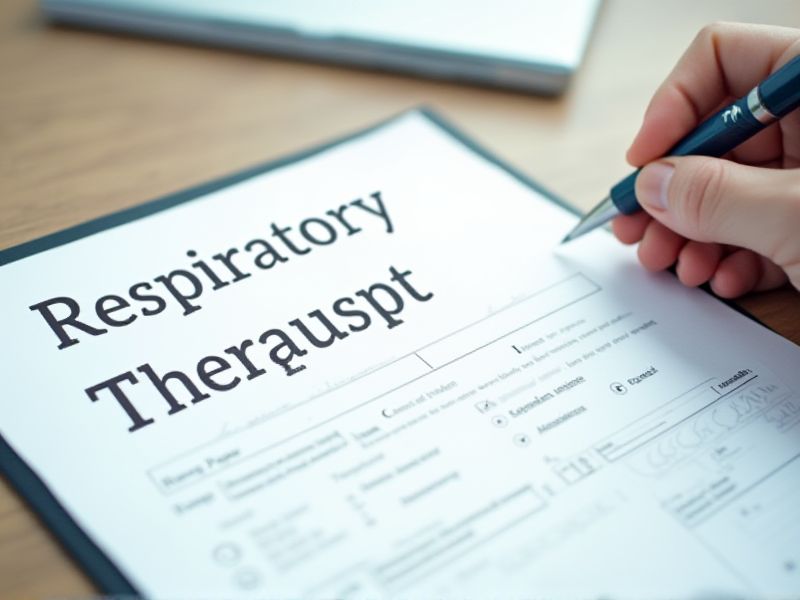
Respiratory therapists play a crucial role in diagnosing and managing patients with breathing disorders. Due to the complexities involved in respiratory care, specific certifications ensure the therapist's skills meet industry standards. Certifications verify the practitioner's competency in advanced therapeutic techniques and equipment handling. Important certifications may be necessary for a respiratory therapist.
Certified Respiratory Therapist (CRT)
Certified Respiratory Therapists (CRTs) meet specific educational and examination standards, validating their ability to effectively manage and treat patients with respiratory issues. This certification ensures adherence to industry guidelines, enhancing patient safety and care quality. CRTs possess specialized knowledge in using advanced respiratory equipment, essential for accurate diagnosis and therapy. The certification often leads to higher employment opportunities, as healthcare facilities prefer certified professionals for their proven competence.
Registered Respiratory Therapist (RRT)
Registered Respiratory Therapists (RRTs) undergo standardized testing, ensuring a consistent level of expertise across the profession. Employers and healthcare facilities require RRT credentials to ensure that practitioners have met rigorous national standards. Patients receiving care from RRTs benefit from evidence-based practices and advanced clinical skills. The RRT designation enhances trust from patients and colleagues, improving overall healthcare delivery.
Basic Life Support (BLS)
Basic Life Support (BLS) provides respiratory therapists with essential skills to manage airway emergencies effectively. Knowledge of BLS enables therapists to perform CPR and use AEDs during critical respiratory distress situations, enhancing patient survival rates. BLS training ensures therapists can rapidly respond to cardiac and respiratory arrests, stabilizing patients before advanced medical interventions. Having BLS certification reinforces competence in emergency care, aligning with healthcare standards and improving patient outcomes.
Advanced Cardiovascular Life Support (ACLS)
ACLS training equips respiratory therapists with skills to manage critical cardiovascular emergencies, enhancing patient survival rates. Without ACLS certification, therapists may lack the protocol-based approaches needed for effective resuscitation during cardiac arrest situations. ACLS knowledge ensures respiratory therapists can efficiently work within interdisciplinary teams to provide comprehensive emergency care. The implementation of ACLS skills in clinical practice correlates with improved patient outcomes in high-stakes environments.
Pediatric Advanced Life Support (PALS)
Respiratory therapists often encounter pediatric patients with critical respiratory conditions, necessitating expertise in Pediatric Advanced Life Support (PALS) for effective intervention. Mastery of PALS protocols enhances the ability of respiratory therapists to manage respiratory distress and arrest in children, improving survival rates. Comprehensive PALS training equips these professionals with skills to collaborate effectively with multidisciplinary teams during pediatric emergencies. Recognizing and addressing pediatric respiratory emergencies promptly through PALS can prevent potential complications and long-term health impacts.
Neonatal Resuscitation Program (NRP)
The Neonatal Resuscitation Program (NRP) equips respiratory therapists with essential skills to manage critical situations in newborns, which often involve respiratory distress. Given that newborns can suffer from conditions like meconium aspiration or breathing irregularities, trained therapists are pivotal in ensuring effective airway management. NRP provides a standardized approach to neonatal emergencies, enhancing the ability to prevent long-term complications. Through this training, respiratory therapists can improve survival rates and outcomes for newborns requiring immediate assistance.
Certified Pulmonary Function Technologist (CPFT)
A Certified Pulmonary Function Technologist (CPFT) is needed for respiratory therapists because they possess specialized skills to accurately conduct and interpret pulmonary function tests. The CPFT certification enhances a respiratory therapist's ability to diagnose and manage respiratory conditions by providing precise lung function data. Certification ensures adherence to standardized procedures, improving patient safety and care quality. Employers often prefer or require CPFT-certified professionals to meet regulatory standards and maintain a high level of clinical competence.
Sleep Disorders Specialist Certification
Sleep disorders specialist certification enhances the respiratory therapist's competency in diagnosing and managing sleep-related breathing disorders. The specialized knowledge gained through the certification enables better patient outcomes due to improved treatment plans. Access to advanced career opportunities escalates as the certification differentiates them in the healthcare field. Certification often translates to increased confidence among patients and employers regarding the therapist's expertise.
Asthma Educator Certification
Asthma educator certification equips respiratory therapists with specialized knowledge to effectively manage and educate patients with asthma. This certification leads to improved patient outcomes by enabling therapists to develop personalized asthma action plans. Enhanced expertise in asthma education reduces hospitalization rates and healthcare costs by ensuring better self-management among patients. Prior certification facilitates collaboration with healthcare teams, fostering a comprehensive approach to asthma care.
Mechanical Ventilation Specialist Certification
Obtaining a Mechanical Ventilation Specialist Certification enhances a respiratory therapist's expertise in managing complex ventilation scenarios, leading to improved patient outcomes. Given the increasing prevalence of chronic respiratory conditions, certified specialists are better equipped to address diverse patient needs in various healthcare settings. Certification supports adherence to evolving standards and protocols, reducing risks associated with improper ventilation management. Employers often prefer certified specialists, leading to heightened job prospects and career advancement opportunities for respiratory therapists.
Summary
You can anticipate a boost in your career prospects when you, as a Respiratory Therapist, obtain additional certifications. Enhanced knowledge and skills obtained from certifications often lead to improved patient care and outcomes. In acquiring specialized credentials, your expertise becomes more attractive to employers, often resulting in higher compensation. Certification could also pave the way for leadership roles and further professional growth within respiratory therapy.
